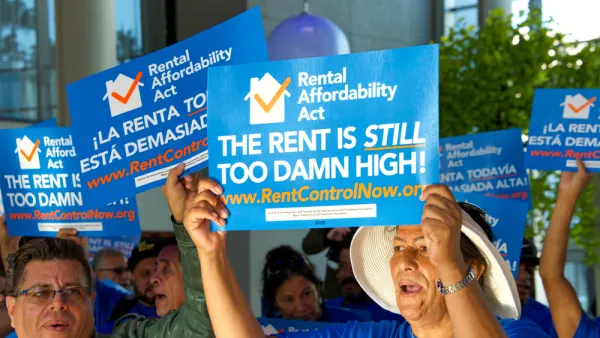There are significant differences between Proposition 21, a statewide rent control measure on the ballot in California, compared to a similar measure defeated soundly by voters in 2018.

Liam Dillon explains Proposition 21, which would alter statewide rent control limits just two years after voters resoundingly defeated a similar statewide measure known as Proposition 10.
Dillon writes to explain the differences between the two propositions—most of the changes have been made by rent control advocates of making the idea more palatable to voters—and to describe the stakes in the election for the state's ongoing housing affordability crisis.
The key is in how much local control is being granted: Proposition 21 would allow local governments to decide whether they want to implement local control on broader swaths of the local rental market than is currently allowed by state law, but short of what Proposition 10 would have allowed.
Dillon provides the following list of changes that would be implemented by Proposition 21:
- Apartments, except for those built within the last 15 years. If the initiative passes, cities could implement rent control on apartments built before 2006, with newer apartments eligible to be covered every year following.
- Single-family homes and condominiums, provided that the owner is a corporation or has more than two properties.
- Vacant apartments, but cities would have to allow landlords to increase rents on vacant units by at least 15%.
That represents a much more limited approach to what cities would be able to enact than what Proposition 10 would have accomplished. "Proposition 10 would have just repealed Costa-Hawkins, allowing cities to craft their own guidelines without limits," explains Dillon.
The article includes soundbites from leaders of campaigns on either side of the issue, as well as background on rent control law in California since the approval of the Costa-Hawkins Rental Housing Act. Dillon also shares recent research on the effects of rent control, including research from three Stanford economists published by the American Economic Review journal, as well as a report released just prior to the Proposition 10 vote, by researchers from the University of Southern California. The more recent study makes the claim that rent control lowers rental housing supply by creating incentives for landlords to convert rental units to condominiums. The USC study has fewer negative consequences than traditionally thought, and can contribute to neighborhood stability.
FULL STORY: How California’s Prop. 21 is different from the rent control initiative two years ago

National Parks Layoffs Will Cause Communities to Lose Billions
Thousands of essential park workers were laid off this week, just before the busy spring break season.

Retro-silient?: America’s First “Eco-burb,” The Woodlands Turns 50
A master-planned community north of Houston offers lessons on green infrastructure and resilient design, but falls short of its founder’s lofty affordability and walkability goals.

Delivering for America Plan Will Downgrade Mail Service in at Least 49.5 Percent of Zip Codes
Republican and Democrat lawmakers criticize the plan for its disproportionate negative impact on rural communities.

Test News Post 1
This is a summary

Test News Headline 46
Test for the image on the front page.

Balancing Bombs and Butterflies: How the National Guard Protects a Rare Species
The National Guard at Fort Indiantown Gap uses GIS technology and land management strategies to balance military training with conservation efforts, ensuring the survival of the rare eastern regal fritillary butterfly.
Urban Design for Planners 1: Software Tools
This six-course series explores essential urban design concepts using open source software and equips planners with the tools they need to participate fully in the urban design process.
Planning for Universal Design
Learn the tools for implementing Universal Design in planning regulations.
EMC Planning Group, Inc.
Planetizen
Planetizen
Mpact (formerly Rail~Volution)
Great Falls Development Authority, Inc.
HUDs Office of Policy Development and Research
NYU Wagner Graduate School of Public Service





























